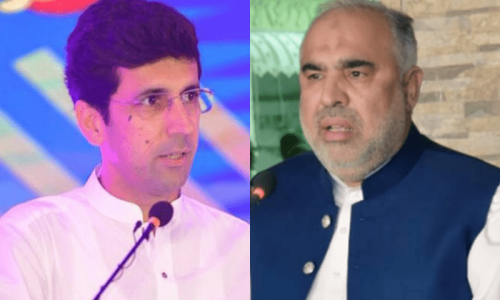China raises the stakes

Now that President Xi Jinping has concluded his visit to Pakistan, leaving behind him much optimism, it is time to reflect on the meaning of the event.
For a country that has been the favourite punching bag of the international community for almost a decade now, a visit from the head of an emerging great power who shared words of warmth and friendship has been a breath of fresh air.
In the days to come, many will hype up the importance of the visit, while others will try to puncture the optimism with their cynicism. At this early point, there are two things to note regarding the visit, and the message that President Xi brought with him to Pakistan.
Read: Pakistan was with us when China stood isolated: Xi Jinping
First, the view that China takes of South Asia was revealed in his speech to parliament. He urged Pakistan to play a more proactive role in bringing about reconciliation between the government and the warring factions in Afghanistan. He also pledged cooperation in the fight against “non-traditional actors”.
And he avoided any mention of Pakistan’s territorial disputes with India, preferring to speak of the latter only as an addition to the economic corridor that he is proposing, which could extend eastward through India to Myanmar and beyond.
In China’s view, peace and stability in South Asia are more important than rivalry and conflict, and President Xi’s speech to parliament made it clear he believes Pakistan holds the key to this.
This is a hopeful sign. In the past, other countries, most notably the United States, have said the same thing, urging Pakistan to renounce support for “non-traditional actors” as an instrument of foreign policy, and to find peaceful ways to address its territorial disputes to the east, as well as its fears of encirclement from the west.
But the US was hobbled by the baggage of the past, having played its part in nurturing these very same “non-traditional actors” during the Soviet occupation of Afghanistan, then walking away from the conflict once its own objectives were achieved. It also served as an erratic and somewhat hapless broker in its attempts to nudge India and Pakistan along the path of dialogue.
But China has no such baggage. It commands credibility amongst the leadership as well as the populations of all countries in the region; and now that they are willing to own the same message of peace and stability in South Asia, there is hope that the message might actually find receptive ears.
Needless to say, much depends on whether or not this happens.
The second thing to note is the theme that ran through the speech. Pakistan has been an enduring friend to China, he said.
And in return, China now wishes to include Pakistan in its larger regional plans titled ‘One Belt, One Road’, where Pakistan can serve as a bridge between the New Silk Road for Eurasian connectivity, and a Maritime Silk Road between the ASEAN countries.
If properly executed, the China Pakistan Economic Corridor could prove a transformative vision that can be the driver of Pakistan’s growth rates for decades to come. Again, much depends on whether the opportunity is properly understood.
The invocations of enduring friendship are music to the ears of a country accustomed to being vilified globally for so many years now.
But it is important to note that President Xi opens almost every speech in every country with similar invocations.
His style of diplomacy is to make everyone he addresses believe they are special. It would be a mistake to understand this to mean that there is no obligation on our part. The ‘One Belt, One Road’ vision has more than 60 countries participating.
But nothing is assured, nor is Pakistan the only country that can serve as a bridge. To successfully become part of this initiative, Pakistan will have to live up to its side of the bargain, which includes doing its bit to promote stability in the region and creating the right economic environment for the promised investment to operate in.
The words President Xi had for us were heartening but will only be meaningful if we can match them with deeds on our side. That is where the question marks now linger.
Published in Dawn, April 22nd, 2015
On a mobile phone? Get the Dawn Mobile App: Apple Store | Google Play













































